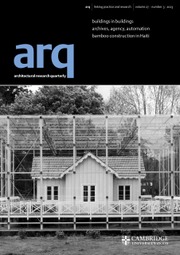Article contents
Spaces of rehearsal: theorising socio-spatial practices in a postconflict context
Published online by Cambridge University Press: 26 August 2020
Extract
This paper sets out the socio-spatial practices of PS2 and Street Society in territorialised, post conflict Northern Ireland – whose work combines pedagogical and improvisation theory to prototype distinctive social models. These practices were formed by a continual process of practical involvement and reflection (through writing) and evaluation (funding permitting), alongside the author-practitioners' search for theoretical concepts that would bring clarity and an alternative perspective to the processes and outcomes. Concepts and approaches taken from pedagogical theory and, uniquely in the case of architecture, improvisational theory, will be used to explore critical aspects of the specific practices, and more generally assert that such socio-spatial ‘street pedagogy’ offers a space of rehearsal and ultimately, a site for the development of socially-just aesthetics. The paper thus proposes a theoretical scaffolding for practices which increase diversity and diminish resource consumption in the contexts of climate emergency and a politics of precarity.
Information
- Type
- Practice
- Information
- Copyright
- © The Author(s), 2020. Published by Cambridge University Press
- 2
- Cited by

